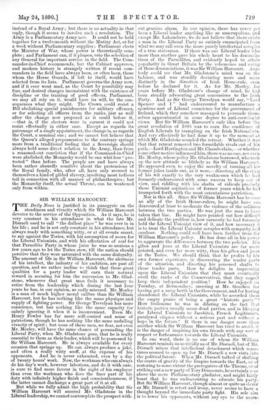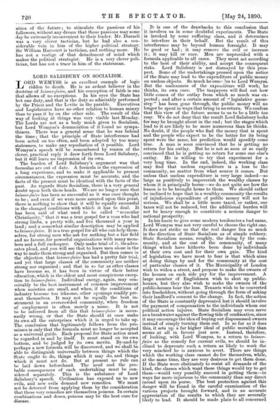SIR WILLIAM HARCOURT. T HE Daily News is justified in its
panegyric on the steadiness and vivacity which Sir William Harcourt devotes to the service of the Opposition. As it says, he is very constant in his attendance in what the late Mr. Disraeli used to call "the dullest place" he was ever in in his life ; and he is not only constant in his attendance, but always ready with something witty, or at all events smart, to say against the Tories, with his assumption of scorn for the Liberal Unionists, and with his affectation of zeal for that Parnellite Party in whose juice he was so anxious a few years ago to let the Tories stew, till the nation should perceive that they were saturated with the same disloyalty. The amount of life in Sir William Harcourt, the alertness of his intellect, the industry of his ambition, are past all question, and we rather incline to think that these great qualities for a party leader will earn their natural reward in securing for him the succession to Mr. Glad- stone, whenever that great man finds it necessary to retire from the leadership which during the last four years he has, in our opinion, so sadly misused. Mr. Morley is a man of much higher moral calibre than Sir William Harcourt, but he has nothing like the same physique and supply of fighting power. Sir George Trevelyan has more conscience, but has nothing like the same capacity for calmly ignoring it when it is inconvenient. Even Mr. Henry Fowler has far more self-control and sense of patriotism, though he has nothing like the same unfailing vivacity of spirit ; but none of these men, we fear, not even Mr. Morley, will have the same chance of persuading the Liberal Party, when Mr. Gladstone goes, that he is really essential to them as their leader, which will be possessed by Sir William Harcourt. He is always available for every occasion that springs up. He can always produce a joke, and. often a really witty scoff, at the expense of his opponents. And he is never exhausted, even by a day of twenty hours' work. Now, the workman who can always do his day's work, however laborious, and do it with ease, is sure to find more favour in the sight of his employer than even the workman who does the finer part of his duty with infinitely higher finish and conscientiousness, if the latter cannot discharge a great part of it at all.
But while we fully admit the high probability that Sir William Harcourt will succeed Mr. Gladstone in the Liberal leadership, we cannot contemplate the prospect with- out genuine alarm. In our opinion, there has never yet been a Liberal leader anything like so unscrupulous, and except Mr. La.bouchere, we do not believe that there esists a man in the Liberal Party so entirely emancipated from what we may call even the more purely intellectual scruples of a true statesman. If there was one Liberal leader who more than another gave his whole heart to his denuncia- tions of the Parnellites, and evidently hoped to attain popularity in Great Britain by the vehemence and swing of those denunciations, it was Sir William Harcourt. Any- body could see that Mr. Gladstone's mind was on the balance, and was steadily deviating more and more distinctly in the direction of Irish Home-rule, even before he declared for it. As for Mr. Morley, for years before Mr. Gladstone's change of mind, he had. been steadily advocating great concessions to the Irish Party. And. as Sir George Trevelyan would say, "Lord. Spencer and I" had endeavoured to manufacture a spurious sort of Liberal conscience for the government of Ireland, which they somehow managed to persuade them- selves approximated in some degree to anti-coercionist views. But Sir William Harcourt's only idea before the great revolution of 1885 was to earn the confidence of English Liberals by trampling on the Irish Nationalists. And very effectively he had done it up to the moment at which Mr. Gladstone sounded the retreat. Whether it was that that retreat removed two formidable rivals out of his path,—Lord Hartington and Mr. Chamberlain,—or whether some other motive influenced him, there was no one, not even Mr. Morley, whose policy Mr. Gladstone borrowed, who took up the new attitude so blithely as Sir William Harcourt. He appeared even to enjoy the novelty of turning all his former jokes inside out, as it were,—directing all the sting of his wit exactly to the very weaknesses which be had formerly endeavoured with some success to keep out of view, and riddling with his shafts of ridicule precisely those Unionist aspirations of former years which he had trumpeted forth with the most ostentatious patriotism. Nor is this all. Since Sir William Harcourt has become an ally of the Irish Home-rulers, he might have en-. deavoured at least to moderate the violence of the collision between the two parties. He was just the man to have taken that line. He might have pointed out how difficult and delicate the problem is, how earnestly he bad formerly held the Liberal Unionist view of it, and how necessary it is to treat the Liberal Unionist scruples with sympathy and candour. Nothing could well have been further from Sir William Harcourt's policy. He has done all in his power to aggravate the differences between the two policies. 1-1 is gibes and jeers at the Liberal Unionists are far more pointed, and even far more witty, than his gibes and jeers at the Tories. We should think that he profits by his own former experience, in discovering the tender parts of the situation, and directing his poisoned shafts to those tender parts. How he delights in impressing upon the Liberal Unionists that they must eventually swell the ranks of the Conservatives, that they cannot keep their independent position ! How he enjoyed on Tuesday, at Bermondsey, sneering at Mr. Goschen for having got a snug berth in the Government, and for having abandoned the Liberal Unionists, while he accorded them the empty praise of being a great "historic party" ! How frolicsome he was in dilating on the fact that historic parties usually mean dead parties, and in likening the Liberal Unionists to Jacobites, French Legitimists, paralysed cliques without a serious past and without a hope in the future ! If there is one danger more than another which Sir William Harcourt has tried to avoid, it is the danger of inspiring his own friends with any sort of respect or forbearance towards the Liberal Unionists.
In one word, there is no one of whom Sir William Harcourt reminds us so vividly as of Mr. Disraeli, but of Mr. Disraeli minus that intellectual detachment which some- times seemed to open up for Mr. Disraeli a new vista into the political future. When Mr. Disraeli talked of shifting the centre of gravity of the Empire towards the East, or of restoring to some extent the prerogative of the Throne, or of striking out a new party of Tory Democrats, he certainly rose above the mere Parliamentary gladiator, and might fairly boast that he was endeavouring to educate his party. But Sir William Harcourt, though almost or quite as clever as Mr. Disraeli in retort and irony, never seems to have a thought beyond the immediate party fight. His sole aim • is to lower his opponents, without any eye to the neces-. sities of the future ; to stimulate the passions of his followers, without any dream that those passions may some day be extremely inconvenient to their leader. Mr. Disraeli was a very clever tactician, but he had also a con- siderable vein in him of the higher political strategy. Sir William Harcourt is tactician, and nothing more. He has not a vestige of that detachment of mind which makes the political strategist. He is a very clever poli- tician, but has not a trace in him of the statesman.



































 Previous page
Previous page